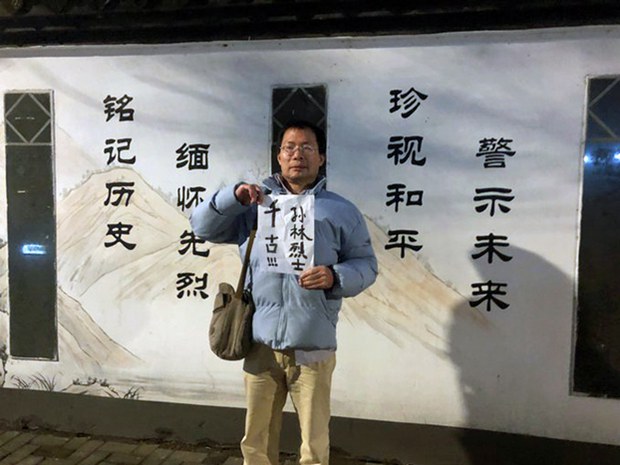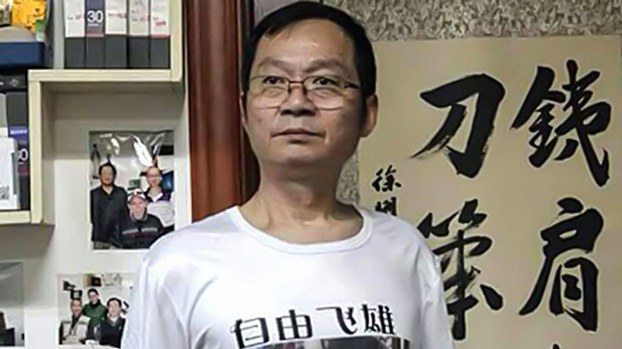Nanjing police detain activist who spoke out about Sun Lin’s death
Share

Chinese dissident Zou We holds a placard to call attention to the death of journalist Sun Lin in an undated photo.
Authorities in the eastern Chinese city of Nanjing have detained a dissident who spoke out about the death of outspoken journalist Sun Lin after state security police broke into his home, as government censors moved to delete and block any news of the incident, rights groups said.
“Police in #China detained dissident Zou Wei who spoke up about the death of dissident #SunLin after brutal police beating,” the overseas-based Chinese Human Rights Defenders group said via its X account.
“Family members and supporters [have been] warned to keep quiet or face persecution if they question police conduct or seek accountability,” it said.
“Zou Wei, a dissident in Hangzhou, Zhejiang [province], was arrested late at night on Nov. 20 by police from [Hangzhou’s] Gongshu district,” the Weiquanwang rights website reported.
Zou was taken away “for raising a placard to speak out,” protesting Sun’s death, the group said, adding that police had also searched the home he shares with his mother.
In a separate article, the group said government censors have blocked any discussion of Sun’s death on Chinese social media.
“While people from all walks of life on overseas platforms are talking about this, the authorities have pretended to be deaf and are behaving as if nothing happened,” the article said.
“Anything on the topic is being strictly blocked, and anyone concerned about the matter can only rely on point-to-point communication,” it said, adding that the fact that state security police around the country are warning other dissidents off traveling to Nanjing suggests a higher level of involvement than just the local police station.
“We cannot rule out the possibility that Sun Lin was beaten to death by local state security police acting on orders from high-level officials,” the commentary said.
‘Gruesome murder’
Paris-based press freedom group Reporters Without Borders, or RSF, said it was “horrified” by Sun’s death, adding that he had been re-posting videos on social media about anti-Xi Jinping protests on the sidelines of the Asia-Pacific Economic Cooperation summit in San Francisco shortly before he died.
It cited the Weiquanwang report as saying that medical staff had reported signs of a physical attack, and that the family had been prevented from seeing his body.
“This gruesome murder is a direct consequence of the Chinese regime’s paranoia, which leads its leaders to see an enemy of the state in every independent media or journalist, and therefore exposes them to systematic retribution,” RSF’s Asia-Pacific bureau director Cédric Alviani said in a statement.
“We urge the international community to build up pressure on the regime for it to end its relentless attacks against press freedom and the right to information,” he said.


Sun’s family members are currently under close surveillance by state security police, activists have told Radio Free Asia, and have been warning fellow activists around the country not to travel to Nanjing to express their condolences or try to attend memorial activities.
Fellow activists have signed an open letter to the Nanjing city authorities calling for an independent probe into Sun’s death.
The Weiquanwang commentary described Sun as “a strong personality, who was very persistent in his pursuit of universal values.”
“Sun Lin once said that he would fight to the death,” it said, adding that Sun had “showed his strong will and unyielding courage” during many encounters with the authorities as a result of his rights advocacy.
“The first time he was arrested, [he] hit his head on a railing and was seriously injured, needing 28 stitches,” said the commentary. “When he appeared in court, he had the word ‘injustice’ embroidered on the front and back of his clothing.”
“The second time he was arrested, he hit his own head on a police car in protest,” it said, calling for an investigation into Sun’s death.
Xi’s ‘crusade against journalism’
Since Chinese leader Xi Jinping took power in 2012, he has engaged in a “large-scale crusade against journalism,” according to Reporters Without Borders.
The group cited the deaths of several journalists and press freedom defenders in recent years “for standing against the regime’s propaganda.”
In 2017, Nobel Peace Prize and RSF Press Freedom Prize laureate Liu Xiaobo and political commentator Yang Tongyan both died in 2017 from cancers that were left untreated in detention, while journalist Dai Shizong was killed under suspicious circumstances in Hunan province in June 2018.
In 2021, Kunchok Jinpa, a leading source of information for journalists about the autonomous Chinese region of Tibet, died in detention as a result of mistreatment, the group said.
China ranks 179th out of 180 in the 2023 RSF World Press Freedom Index and is the world’s largest captor of journalists and press freedom defenders with at least 123 detained, it said.







